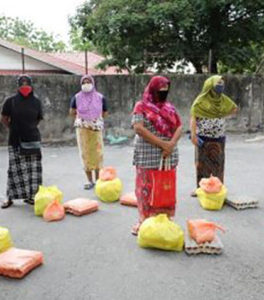Refugees suffer under Malaysian COVIDF-19 lockdown
Malaysia’s COVID-19-induced lockdown through its Movement Control Order (MCO) is causing extraordinary hardship for refugees and asylum seekers in the country.
Most asylum seekers work informally in the cash economy to earn daily or weekly ages and have no job protection. Many have been made redundant and are now relying on help from NGOs and private donors.
 Malaysia includes both refugees and asylum seekers under a broad legal definition of ‘illegal immigrants’, a group which has virtually no rights and little legal protection.
Malaysia includes both refugees and asylum seekers under a broad legal definition of ‘illegal immigrants’, a group which has virtually no rights and little legal protection.
There were almost 180,000 refugees and asylum seekers registered with the UNHCR in Malaysia at the end of March.
But there are reportedly another 500,000 who are unregistered.
The pandemic as well as difficulties brought by the MCO and the prospect of more boats arriving have led to a rise in xenophobic sentiment toward refugees.
Rohingya refugees are the target for most of the hate.
Malaysian policy analyst Thomas Daniel says these developments underscore a need for a comprehensive and transparent policy to regularise and manage refugees and asylum seekers in Malaysia.
“The challenges are neither new nor directly caused by the pandemic. They are the result of years of systemic policy gaps that allowed precipitating underlying issues to fester,” said Mr Daniel of the Foreign Policy and Security Studies Programme at the Institute of Strategic and International Studies (ISIS), Malaysia.
Mr Daniel said policymakers in Malaysia had subscribe to the ‘floodgate’ theory which poses that any perceived softening of the nation’s stance on refugees would attract more.
“There is also concern of a political backlash from voters, who worry they will have to compete with refugees for jobs and limited government resources, and that refugees will demand rights such as naturalisation in the future,” he said.
“Policymakers are also aware that Malaysia is no longer just a transit point for refugees and asylum seekers but a final destination for some — especially the Rohingya,” Mr Daniel said.
He said it was in Malaysia’s interests to have a comprehensive policy in place to manage its refugees.
“Having a large number of unregistered foreigners in a country, with little information about their demographics, background, movement and jobs is a real security and social challenge,” he said.
“Managing the impact of the pandemic on a vulnerable, dispersed group like refugees and asylum seekers also poses a challenge. Their living conditions are less than ideal due to hygiene issues and overcrowding.
“Despite the efforts of refugee associations and NGOs, many were afraid to come forward and consequently were not screened for the virus. A history of neglect and abuse means that most live off the grid and are averse to authorities. This makes contact tracing difficult,” Mr Daniel said.
He said Malaysia’s refugee policy should incentivise all refugees and asylum seekers to be registered in a biometric database that includes health and security checks. This can be done in collaboration with the UNHCR, which has a comprehensive Refugee Status Determination process for their cardholders.
There should be limited permission for refugees to work legally with some protections, he said.
“With a well-thought-out policy in place, Malaysia can finally make real progress on addressing not just the plight of refugees and asylum seekers, but also the significant security and social implications of hosting large numbers of unregistered migrants. Perhaps this will go some way to nipping emerging xenophobia towards one of the most vulnerable groups in Malaysian society,” Mr Daniel said.












